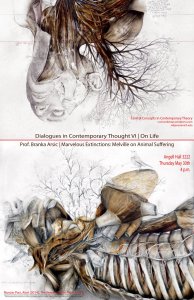Presented By: Department of English Language and Literature
Dialogues in Contemporary Thought VI | On Life
Prof. Branka Arsic | Marvelous Extinctions: Melville on Animal Suffering

Prof. Branka Arsic (Columbia University) will be giving a public lecture on Thursday May 30th, at 4 p.m. QA to follow.
Description: My talk starts out from remarks Melville left in his Encantadas concerning the Galapagos tortoises and goes on to examine the scientific and historical archives to which he had recourse, from Cuvier and Broderip to Porter and Delano. On that basis I seek to reconstruct exactly what, in the early 19th century, prompted scientists, doctors, and naturalists, as well as traders and ordinary seamen, to obsess about the tortoise as a life form, one that was brought to the brink of extinction by the middle of the century. I argue that the reason why both physiologists in Continental scientific laboratories, and whalers traversing Antillean waters in trade ships, chose this particular animal to answer the question of what life is, derived from their ideas about what constituted pain, suffering, and cruelty. By rehearsing such debates over the presumed expressions of suffering, apathy and indifference on the part of the tortoise, I work to suggest that what scientists understood as apathy towards pain licensed the production of a bizarre taxonomy of life forms based on a creaturely capacity to resist violence. I, therefore, pay significant attention to the differences that science advanced between biologically - as opposed to psychologically - rational and irrational life forms, which leads to my concluding analysis of why, as a consequence, the irrational was designated as available for experimentation and vivisection.
Description: My talk starts out from remarks Melville left in his Encantadas concerning the Galapagos tortoises and goes on to examine the scientific and historical archives to which he had recourse, from Cuvier and Broderip to Porter and Delano. On that basis I seek to reconstruct exactly what, in the early 19th century, prompted scientists, doctors, and naturalists, as well as traders and ordinary seamen, to obsess about the tortoise as a life form, one that was brought to the brink of extinction by the middle of the century. I argue that the reason why both physiologists in Continental scientific laboratories, and whalers traversing Antillean waters in trade ships, chose this particular animal to answer the question of what life is, derived from their ideas about what constituted pain, suffering, and cruelty. By rehearsing such debates over the presumed expressions of suffering, apathy and indifference on the part of the tortoise, I work to suggest that what scientists understood as apathy towards pain licensed the production of a bizarre taxonomy of life forms based on a creaturely capacity to resist violence. I, therefore, pay significant attention to the differences that science advanced between biologically - as opposed to psychologically - rational and irrational life forms, which leads to my concluding analysis of why, as a consequence, the irrational was designated as available for experimentation and vivisection.
Explore Similar Events
-
Loading Similar Events...
